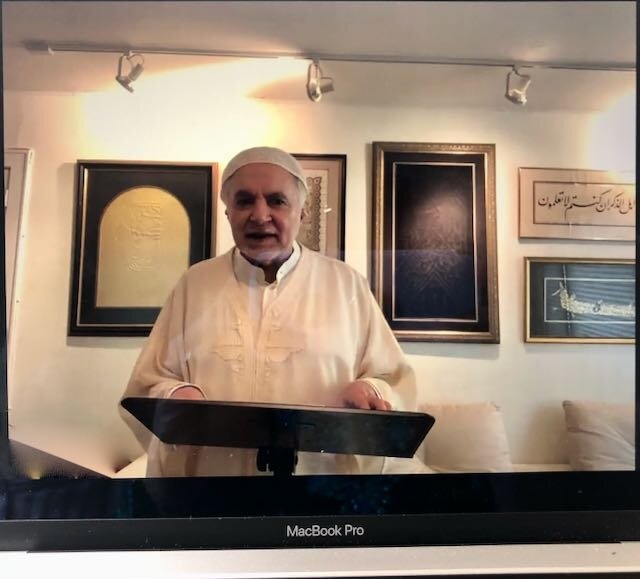For most of my life (which is pretty long), I have not been regular in attending Jummah prayers at the mosque. Jummah is the weekly congregational Muslim prayer held on Friday at mid-day. Between the three Abrahamic faiths, we have the weekend covered: Friday for Muslims, Saturday Sabbath for Jews, and Sunday services for Christians. Some master planning! Getting back to Jummah: do you recall when shelter-in-place went into effect in NYC? Since then, I have not missed a single Jummah. You have gathered by now that I am referring to virtual Jummah.
An email from Cordoba House hit my inbox: ‘Jummah prayers with Imam Feisal on March 27 via Zoom.’
Yes!
I got two-for-one: I got to attend Jummah, and I got to listen to Imam Feisal Abdul Rauf give the khutba (sermon). He delivers the most beautiful sermons; deeply spiritual and instilling a sense of peace and quiet in our hearts. To be in his audience is a treat for the soul.
We had never— my husband and I—attended a virtual Jummah or any virtual prayer, for that matter. We had no idea how the logistics would work, as we set up our computer in the dining room and logged on.
The Imam came on the screen and gave the Adhan, the Call-to-Prayer. (That is now three new words for some of you). Looking into the camera, he began his sermon by establishing the validity of holding Jummah prayer on-line. In my mind, I have no issues whatsoever with on-line prayer, but many believe that Jummah requires physical presence and therefore, online prayer is not permitted. He drew attention to the Islamic juristic principle whereby necessity or need permits that which is forbidden. So, if a doctor prescribes a medication to a Muslim patient who is suffering from a sickness, and the medication contains alcohol (alcohol is forbidden), it is deemed permissible for the duration of the illness. In other words, the pandemic—which requires social distancing—is a time of need, which allows us to do what we do not do under normal circumstances. What the Imam said, and what I didn’t know—you listen and you learn—is that God says in the Quran, ‘when the call is made for the salah on Friday, hasten to the remembrance of Allah’. (Salah is prayer. We are up to four new words). It does not say ‘hasten to prayer.’ And remembrance of God is embodied in the sermon, the primary goal of which is to nourish your spiritual being. To achieve that, one doesn’t have to be present in-person, the physical sense.
Made perfect sense to me. I made a few notes. Since I seldom went to Jummah prayers, I don’t know if attendees take notes; but in the privacy of my home, I took the liberty.
“. . . we don’t define our humanity just or primarily physically. . . we are also mental/intellectual beings, we are emotional/psychic beings, and we are most importantly spiritual beings. Our spiritual dimension is the primary and defining dimension both of our humanity and of our religious imperatives. Your soul is where the creative breath of God within you lies. Your soul is the locomotive of your life and existence. Your soul is the eternal part of you, your soul is the part of you that will be resurrected and judged. . . The Jummah is much more than a physical activity; it is primarily a spiritual activity, and to the extent that we can convey the spiritual dynamic online, this in our judgment validates the online Jummah.”
In the tradition of Jummah, the imam concluded the sermon by reciting verses from the Quran, after which he gave the second Call to Prayer. Now is the time when congregants line up behind the imam for the ritual of prayer. But here we were, in our own home, just the two of us. We spread our prayer rugs on the floor, facing Mecca, standing side-by-side.
“Allahu Akbar,” he raised his hands, and we raised ours (God is the Greatest. Five new words). He recited verses from the Quran and led us through prayer. He ended with a Dhikr—remembrance of God—prompting us to recite the attributes of Allah; recited verses from the Quran; and we joined him in raising our hands in Dua (supplication. Seven new words). He prayed for an end to the pandemic—we said Ameen (Amen. Eight new words); he beseeched Allah to heal the sick—Ameen; and to protect all of humanity from the disease—Ameen. Missing was the collective sounds of Ameen that reverberate with hope.
It has been over six weeks now, and we never miss a Jummah. Ramadan has made it all the more meaningful. We have learned that our coerced retreat is allowing us to be alone with Allah; as our physical movement slows down, we can witness our soul more clearly. We have learned that the pandemic has essentialized our faith and our priorities.
In these times, when our sense of vulnerability is heightened and we yearn to seek strength through spiritual fulfillment, Jummah with Imam Feisal has been that blessed source.
Transcripts and videos of Jummah
Note: Occasionally, you will run into a traffic jam on the highway to heaven—an internet traffic jam—halting the voice or freezing the frame. Just be patient; no need to change lanes.
**********************************************



